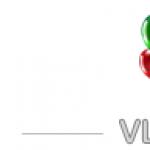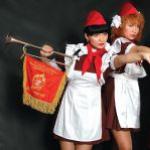How to expand your vocabulary of words. A rich vocabulary is an indicator of a person’s intellectual development
Start with this list, selected especially for you:
Aberration is a deviation from the truth, delusion (distortion).
Addiction - dependence, for example, Internet addiction.
Ambivalent – dual (ambiguous).
Ambitious - ambitious (vain, pretentious, arrogant).
Amikoshonism is an unceremonious, inappropriately familiar address under the guise of friendship.
Apogee – the highest point (culmination, limit).
Apologist – supporter (adherent).
A priori - knowledge obtained before experience and independently of it, that is, knowledge that is, as it were, known in advance.
Test - test.
The Biennale was originally an art exhibition, but nowadays it is also called simply a get-together related to art. The special feature is that it is held every two years.
Newton's binomial is a formula for representing the power of the sum of two numbers. It is used, as a rule, as an expression of something complex as opposed to uncomplicated. For example: “I also like Newton’s binomial!”
Voluntarism is the desire to realize desired goals without taking into account objective circumstances and possible consequences.
Gender - related to the problem of the role of male and female persons in society.
Genesis – origin (emergence, origin).
Gesheft is a speculative, profitable transaction.
Hyperbole is an excessive exaggeration.
Glossary is a list of highly specialized words with translation and explanation of each of them.
Epistemology is a philosophical theory that studies the boundaries of human knowledge.
Homogeneous – homogeneous, identical.
Deviant behavior is one that does not correspond to the norms established in society.
Decadence is decadence.
Deprivation is a feeling of insufficient satisfaction of one's needs.
Destructive - destructive.
Dissonance is a violation of harmony.
Defamation – slander (gossip).
Penance is a punishment.
It is founded - it is founded.
Idiosyncrasy is intolerance to anything, from medicine to people.
Invariant – unambiguous.
Indifferent – indifferent (indifferent, neutral).
An indulgence was previously a document for the atonement of sins. Now used figuratively.
Intoxication – poisoning.
Incident – incident (case).
Establishment - those in power, ruling circles, political elite. A set of people occupying key positions in a socio-political system.
Incident - in general, indicates a strange or unpleasant situation, a combination of circumstances that does not depend on the characters involved.
Catharsis is a change in consciousness through strong experiences (purification).
Cognitive dissonance is new information, the perception of which conflicts with previously accumulated knowledge.
Collision – collision (conflict).
Congruence - proportionality, correspondence, coherence, consistency.
Credo is a worldview.
Lapidity - brevity, conciseness, expressiveness of syllable, style.
Latent - hidden.
Legitimate – legal.
Liquidity is an economic term, but is now used in everyday life. Indicates your ability to convert assets or private property into money.
Skimping is a disdainful attitude.
Matrimonial - marriage (marital).
Misalliance - marriage with a person of lower social status, unequal marriage.
Mercantile – calculating (selfish, petty).
A metrosexual is a young man who devotes a lot of time to caring for himself. In the 19th century, a similar cultural phenomenon was known under the names dandy, dandy, dandy.
Mondegrin - misheard words, for example, words in songs that cannot be understood without reading their text.
Monogamy is monogamy, a form of marriage and family in which a person has only one partner during his life or at any given time.
Negligee - half dressed.
Neologism literally translated from Latin means “new word.” It can be a new word created or a word used with a new meaning.
Notation - moral teaching.
Nouveau riche is a person who quickly got rich, made his way into the upper strata of society, a rich upstart.
Obscurantism is an extremely hostile attitude towards education and science, obscurantism.
Odious - known for its negative qualities, causing a sharply hostile attitude.
Oxymoron (oxymoron) - a stylistic figure or a stylistic error - a combination of words with the opposite meaning (that is, a combination of incongruous things - “a living corpse”).
Orthodox – unswervingly adhering to the foundations of some teaching or worldview.
Ostracism is contempt, rejection, ridicule from the surrounding society (bullying).
Parity – equality (equivalence, equivalence, equality).
Pluralism is diversity or multiplicity, in both mundane and philosophical contexts. Monism – when it’s the other way around – is one thing. Dualism recognizes only duality.
Pragmatic – practical (down to earth).
Preventive – warning.
Pretentiousness is pretentiousness.
Procrastination is a tendency to constantly put off even important and urgent matters, leading to life problems and painful psychological effects.
Layman - ignoramus (amateur, unprofessional).
Proforma is a formality.
Puritanism is a unique understanding of purity of views and behavior in society. Characteristic features are moderation, conservatism of views, minimization of pleasures, claims, and needs.
Radicalism is extreme adherence to views, the use of crude methods to create change, often in social foundations.
Rarity is rare.
Repression is punishment (punishment, violence).
Respectable – venerable (presentable, worthy, solid).
A maxim is a saying of a moralizing nature.
Sybarism - idleness, spoiled by luxury; sybarite is the bearer of these qualities.
A simulacrum is an image or explanation of something that does not exist in reality. A copy that does not have the original.
Synopsis - review, concise presentation.
Scrupulous – meticulous (pedantic).
Sophistry is the deliberate use of false arguments, verbal fornication that promotes lies.
Trendy - fashionable.
Interpretation - a similar word is interpretation. In general, we are talking about some kind of comment, explanation, view of a certain phenomenon.
Transcendent – unknowable (irrational, incomprehensible).
A truism is a generally known opinion or statement. A typical example of a truism is “Baikal is not a sea, but the deepest lake.”
Exaggerate - exaggerate.
Fetish is an object of worship, an idol.
Frustration – disappointment, depression, despondency.
Hypocrisy is the creation of a positive image of one’s own personality, a deliberately strong negative attitude towards free views, flaunted virtue, modesty (sometimes religiosity). Although in reality the hypocrite is far from the ideals declared out loud.
Charisma – originality (charm, attractiveness).
Time pressure - lack of time.
Swaggering is an arrogant and dismissive attitude.
Chauvinism initially refers to nationalism and represents its radical form. Chauvinists considered their own nation to be exceptional and the best. The term can be used in other contexts, but the meaning of the understanding of exclusivity remains.
Scrupulousness is treating something with care and rigor.
Euphemism is the replacement of rude or harsh words and expressions with softer ones.
An egocentric is a person who is unable to accept someone else’s point of view, an egoist.
Esoterics is a secret teaching.
Exalted – enthusiastic (excited, inspired).
Equivocations are ambiguous hints, subterfuges.
Eclecticism is a combination of heterogeneous styles and trends, ideas and theories.
Extravagant – unusual (provocative, original, peculiar).
Empathy is the ability to perceive the world through the eyes of another, to be interested in how another thinks, lives and feels.
To shock - to amaze (stun, shock).
Etymology is the field of knowledge about the origin and meaning of words. In order to expand your own vocabulary, it is useful to study etymology.
Jurisdiction is the range of powers that a government body or structure has.
Jagdtash - hunting bag. Now the term is used as a name for a convenient, stylish bag.
General
Vocabulary expansion
LEV TOLSTOY: "COMMUNICATING WITH A LANGUAGE SOMEHOW IS A MEANING TO THINK SOMEHOW."
- Approbation
- Vernissage
- Devaluation
- Idiom
- Pun
- Cannonade
- COHORT
- Legion
- Marina
- Polysemy
- RAVELIN
- Reminiscence
- Sacramental
- Synecdoche
- Syntagma
- Sonorant consonants
- Toponym
- Phantasmagoria
- Pleonasm
- Allegory
- Nihilism
- Cacophony
- Kalancha-
- Esperanto
- Idiosyncrasy
- Transcendental( transcendens)
- Metaphysical
- Scholasticism
- Esoterics
- Truism(true)
- Glossary
- Euphemism
- The cognitive dissonance
- Eclecticism
- Epistemology
- Invective
- Binomial theorem
- Voluntarism
- Congruence
- Decadence
- Addiction
- gender
- Homogeneous
- Ubiquists
- Uentnost
- Frustration
- Vanguard
Completion Criteria
2) Vernissage (French vernissage, literally - varnish coating) - the opening of an art exhibition in a ceremonial atmosphere, attended by specially invited persons
3) Devaluation (lat. de - decrease; lat. valeo - to have value, to cost) - a decrease in the gold content of a monetary unit under the gold standard
4)IDIOMA, -ы, w. In linguistics: a figure of speech, the meaning of which is not determined by the individual meanings of the words included in it, for example. to beat the thumbs, to sharpen the lasses.
5) Pun - A joke based on the comic use of words that sound similar but have different meanings, a play on words.
6) Cannonade - sounds of shots from artillery guns
7) COHORT, 1. In Ancient Rome: a detachment of troops, a tenth of the legion. 2. transfer A tightly knit group of associates (high)
8) Legion (lat. legio, gender legionis - military gathering, conscription, from lego and legere - to collect) - the main organizational unit in the army of Ancient Rome.
The legion consisted of 5-6 thousand (in later periods 4320) infantry and several hundred horsemen
9) Marina (French marine, Italian marina, from Latin marinus - sea) - a genre of fine art depicting a marine view
10) Polysemy (from the Greek πολυσημεία - “polysemy”) - polysemy, multivariance, that is, the presence of a word (unit of language, term) of two or more meanings, historically conditioned or interconnected in meaning and origin.
11) RAVELIN m. 1) An auxiliary fortification structure in the shape of a triangle with the top facing the enemy, located in front of the main fortress fence. 2) One of the ravelins of the Peter and Paul Fortress, turned by Peter I into a prison for his son Alexei and later used by the tsarist government to imprison political criminals; Alekseevsky ravelin.
12) Reminiscence (lat. reminiscentia, memory) - an element of the artistic system, which consists in the use of the general structure, individual elements or motifs of previously known works of art on the same (or similar) topic.
(Example of reminiscence)
13) Sacramental - religious. religious, ceremonial, ritual
14) Synecdoche (ancient Greek συνεκδοχή - ratio, literally - “co-understanding”) - a trope, a type of metonymy, based on the transfer of meaning from one phenomenon to another based on the quantitative relationship between them. Typically used in synecdoche:
Singular instead of plural: “Everything is sleeping - man, beast, and bird.” (Gogol);
Plural instead of singular: “We all look at Napoleons.” (Pushkin);
Part instead of whole: “Do you need anything? “In the roof for my family.” (Herzen);
The whole instead of the part: “Japan has opened in different directions.” (Stock News); (instead of: shares on the Tokyo Stock Exchange);
Generic name instead of specific name: “Well, sit down, luminary.” (Mayakovsky) (instead of: sun);
The specific name instead of the generic name: “Take care of your penny above all else.” (Gogol) (instead of: money).
15) Syntagma (ancient Greek σύνταγμα, lit. “order”, from ancient Greek σύν “with” and other Greek τάγμα “order”) - a polysemantic term translated as classification, systematization; layout, arrangement.
16) Sonorant consonants - What distinguishes sonorant consonants from other voiced consonants is that noise practically does not participate in their formation (l, m, n, p, j.)
17) Toponym - a proper name, which is the name of a separate geographical object
18) Phantasmagoria - bizarre, fantastic events, incidents
19) Pleonasm (ancient Greek πλεονασμός - unnecessary) - a figure of speech in which words that partially or completely coincide in meaning are repeated unnecessarily. Examples: “old man”, “young
young man”, “to see with my own eyes”, “the month of May”
20) Allegory - allegory, expression of an abstract concept through a concrete image (Example: allegory of “justice” - a woman with scales)
21) Nihilism (from Latin nihil - nothing) is a worldview position expressed in the denial of the meaningfulness of human existence, the significance of generally accepted moral and cultural values, and non-recognition of any authorities.
22) Cacophony (ancient Greek κακός - bad and other Greek φωνή - sound) - combinations of sounds, perceived as a chaotic and meaningless accumulation of them.
23) Tower - watchtower, fire department tower
24) Esperanto is an artificial (planned) international language, created primarily on the basis of the vocabulary and grammar of the most common European languages
25) Idiosyncrasy (idios) - intolerance. For example: I have an idiosyncrasy for fools!
26) Transcendental (transcendens) – abstract, abstract, academic, mental, speculative, mental, theoretical. Somewhere like this. Due to the breadth of the concept, a broad use of the term is recommended, where it is necessary and where it is not necessary.
27)Metaphysical - approximately the same as Transcendental. The term is good for answering a question whose essence you do not understand. For example, like this - “How do you feel about scholasticism? - In a metaphysical sense?”
28) Scholasticism is a medieval philosophical movement. I included scholasticism in my list of smart words solely because of its beautiful name.
29) Esotericism (from ancient Greek ἐσωτερικός - internal) - a set of special ways of perceiving reality that have secret content and expression in “psychospiritual practices”
30) Truism (true) - a well-known opinion or statement. A typical example of a truism is “The Volga flows into the Caspian Sea.”
31) Glossary - a dictionary of highly specialized terms in any field of knowledge with interpretation
32) Euphemism - replacing rude or harsh words and expressions with more
soft. Among the people, the phenomenon received a very biting and precise formulation
33) Cognitive dissonance (from the Latin words: cognitio - “knowledge” and dissonantia - “dissonance, discord, lack of harmony”) is a state of mental discomfort of an individual caused by a collision in his mind of conflicting ideas: ideas, beliefs, values or emotional reactions.
34) Eclecticism is a combination of heterogeneous views, ideas and theories.
35) Epistemology is a theory of knowledge, the main part of philosophy that considers the conditions and limits of the possibility of reliable knowledge.
36) Invective - obscene, vulgar language, swearing. Often used in combination with invective vocabulary.
37)Newton’s binomial is a formula for representing the power of the sum of two numbers. It is used, as a rule, as an expression of something complex as opposed to uncomplicated. For example: “I also like Newton’s binomial!
38) Voluntarism is a doctrine that places the volitional principle as the basis of existence. Nowadays, it is used as an evaluative term for a person’s actions that you personally do not like. Eg. : “Vanya drank all the tequila. This is pure voluntarism!”
39) Congruence is a very rich word. One of my favorites. Means a state of integrity and complete sincerity, when all parts
individuals work together towards the same goal. It is also often used with the prefix not. A very congruent word.
41) Addiction - dependence. Eg. Internet addiction. Like mine.
42) Gender – sexual. Intergender, respectively, intergender.
43) Homogeneous - homogeneous. For example: “The homogeneity of this yogurt is beyond doubt.”
44) Ubiquists are species of plants and animals that live everywhere. Don’t get carried away with this term, no one knows it anyway except you and me.
45) Cavalcade - a group of riding riders
46) Frustration is disappointment. our life is a chain of frus
47) Vanguard - Part of the troops (or fleet) located in front of the main forces. An advanced, leading part of some social group. At the forefront of the democratic movement (in front, in the forefront).
A lot has been said and written about how to increase your vocabulary. Most educated people think about this regularly, even if their activities are not directly related to rhetoric or oratory. The Russian language, rich and beautiful, allows people who speak it to express their thoughts expressively, elegantly and variedly. Good command of your native language is a serious advantage in work, relationships, and in any communications with others.
How to replenish your vocabulary, what methods and activities will be most effective? Let's try to figure it out.
Varieties of vocabulary
When we think about how to expand our vocabulary, it is important to understand that first of all we are talking about increasing our active vocabulary.
Active vocabulary is the words that you and I use in everyday life, communicating with friends, family, and colleagues. We pronounce them easily and naturally, they are firmly embedded in spoken and written language. It doesn't take much effort for us to find the right word.
Passive vocabulary is words whose meaning is generally clear and known to us, but we practically do not use them. Perhaps this is inappropriate in our social circle, or there are some other reasons. Then, in order to remember a word, we have to make some effort.
External vocabulary is highly specialized terms whose meaning we do not fully know. Usually these are words that are used in a professional environment, among a small circle of people.
As a rule, most people have a very limited active vocabulary: it’s good if a hundredth of the total volume is used in speech. Therefore, when the question arises of how to replenish your vocabulary, this means that you first need to replenish your stock of constantly used words.
Learning to speak again
 What do we do when we share our experiences with friends or call customer support and cannot find a suitable name or accurately describe our emotions or sensations?
What do we do when we share our experiences with friends or call customer support and cannot find a suitable name or accurately describe our emotions or sensations?
But we agreed that we would think about how to improve our vocabulary, right? Then we begin to develop awareness:
 The recipe is actually quite simple: to learn to speak beautifully, you need to... talk. This is true. Learn to speak in direct communication. Tell stories, plots of books or films, news or impressions. Try to use new words that you have not used before. Include them in your life consciously.
The recipe is actually quite simple: to learn to speak beautifully, you need to... talk. This is true. Learn to speak in direct communication. Tell stories, plots of books or films, news or impressions. Try to use new words that you have not used before. Include them in your life consciously.
- Write letters
 Writing can also help solve the problem of how to increase the number of words used. Write letters. Write on forums or social networks. Try writing articles or essays. Keep a diary.
Writing can also help solve the problem of how to increase the number of words used. Write letters. Write on forums or social networks. Try writing articles or essays. Keep a diary.
Carefully select words and figures of speech, look for synonyms - practice and more practice are important in this matter.
- Give a speech
Public speaking and responsible conversations help to enrich speech very well. Make a sketch on paper in advance. Train, look for different options that most accurately and fully reflect your point of view. If you have to speak in front of a large audience, make the speech bright and rich rather than dull and unemotional.
- Learn poetry
Learn poems by heart, retell texts. It is important not just to tell the text, but to do it as close as possible to the author’s style, paying attention to new words and phraseological units. Tell it emotionally, with expression, then new words will be easier to remember.
- Constantly expand your active and passive vocabulary: both are important. Listen to audio books, solve crosswords, watch useful educational programs and communicate with educated, developed people.
- To better remember a new word or turn of phrase, create a vivid image and visualize it inside yourself. Words are remembered well in conjunction with others, in sentences, and not on their own.
- Write down your favorite quotes and expressions. Use them in your speech. The main thing is that it is appropriate.
- Do not use slang words and obscenities: approach the issue creatively, look for colorful, bright replacements.
- Don't fill your short-term memory with useless information.
- Learn a foreign language. Any. Oddly enough, this allows you to simultaneously replenish the active and passive vocabulary of your native language too.
How to activate a passive set of words
Our passive vocabulary is constantly expanding. This mainly happens in two cases: while we listen and when we read. So its filling begins in childhood. Purposefully learning words in this case does not make much sense: they will remain passive.
- Choose synonyms for words
The selection of synonyms helps to activate the passive stock very well. There is a whole series of interesting games where some phenomenon or object needs to be described in words, excluding the use of familiar and frequently used words from the list. You can arrange such games in a friendly company or practice alone.
It is useful to make lists of synonyms. For example, a dictionary of feelings. Write down all the feelings you know in a column and try to write as many synonyms for them next to them as possible. Of course, it is important not only to write them, but also to use them in your speaking and writing.
- Make up stories
Another useful and entertaining exercise: writing a story using only nouns. Or verbs. Or - the most difficult thing - adjectives. Remember? "Night. Street. Flashlight. Pharmacy". How can I continue?
Here are other options: compose a story where words begin with each letter of the alphabet in order. Or all words begin with only one letter. It is important that the story be connected.
Many articles have been written about how to increase your vocabulary. However, most of them have a noticeable drawback: they talk about enriching the lexicon as a whole, without dividing into active and passive vocabulary. Meanwhile, if we want to make our speech expressive and convincing, we should focus on expanding only the active vocabulary and on transferring a certain layer of vocabulary from passive reserve to active use. T&Ps talk about how to cope with a given task.
Sign of education
The problem of expanding active vocabulary arises more often when learning a foreign language than when using a native one. Conducting a conversation in English, Italian or Chinese, we periodically find ourselves in a situation where we don’t know a specific word, we can’t find a synonym for it, and even in a roundabout way, through descriptions, comparisons and associations, we’re unable to express a thought - which means we have to grasp for the dictionary. It’s easier with our native language: if the required lexical unit doesn’t come to mind, we will always find a way to get out by finding a more or less exact equivalent for it.
We think about increasing vocabulary within our native language if we need to impress the audience or want to impress our interlocutor with eloquence - that is, when emotions come into play. An extensive vocabulary is an indicator of education and helps to raise self-esteem, and for journalists, copywriters and translators it is also a tool for earning money. Strategically, masterful command of words helps us express our thoughts, emotions and attitudes to life situations as accurately as possible and build effective communication.
The traditional list of recommendations for expanding your vocabulary is two or three clicks away from us and wanders from blog to blog, from year to year with minimal changes. There is some truth in this list, but some advice already does not correlate well with the realities of today's life and with the modern way of thinking, communicating and acquiring knowledge. And others seemed suspicious from the very beginning, but nevertheless continue to be presented as effective recipes. We will criticize typical advice later, but right now we’ll talk about something relevant.
Clear the area
Remember synonyms
Make it a rule to write posts on social networks, spending 10 minutes on it three times a day. In the morning, at lunchtime and in the evening, hand out a miniature sketch on any interesting topic, carefully thinking through each phrase and trying to include as many strange words as possible. The goal is for your friends to suspect that your account has been hacked and that it is not you who is writing this, because the style and style are completely unrecognizable. Regularly re-read your previous posts and try to avoid repetitions of both lexical units and grammatical structures. If you're annoyed by moral exhibitionists who post their breakfasts and mood swings for everyone to see, change your privacy settings and make these posts visible only to yourself. As an alternative, of course, you can keep a paper notebook or a Word file and write sketches there - but we are still on social networks, and the file still needs to be found in the folder and opened, for which we will never have enough time.
Keeping a notebook of synonyms or writing words on cards is one of the most popular classic tips for expanding your vocabulary. The big disadvantage of this method is that it is most effective to learn words not individually, but in context and in connection with a specific topic - it’s not for nothing that in foreign language textbooks each lesson is built around a specific topic. If you like to use notepads and flashcards (whether paper or electronic), it will be more useful not just to memorize words one by one, but to come up with phrases with them and visualize different dialogue situations.
The widespread advice to always keep a dictionary at hand and look at it more often seems a little dubious. This in itself is a wonderful idea, but it is aimed at expanding passive rather than active vocabulary. Having opened any page of the explanatory dictionary, we will be convinced that we have long known most of the words listed there, and those whose meanings are not familiar to us, we probably simply do not need. So we keep the dictionary nearby, but we don’t place much hope on it.
How to read books
It is quite obvious that to enrich your vocabulary it is useful to read a lot - just what and how exactly should you read? For our generation, the reference speech will most likely be the speech of the mid-twentieth century, which, on the one hand, is close to modern in many ways, and on the other, has not yet had time to absorb the barbarisms and jargon that came with the perestroika era. Having picked up a work of art, we, as a rule, quickly get carried away by the plot, stop paying attention to the vocabulary, and the linguistic richness of the novel happily passes all our radars. To avoid this, you can use a psychological trick and read memoirs, autobiographies, or any other books written in the first person. If you read them slowly and thoughtfully, and ideally also out loud, ready-made phrases will settle in your memory that we can use when talking about ourselves. True, these phrases must be retrieved from memory as quickly as possible so that they do not disappear into the muck of a passive dictionary.
Reading and memorizing poetry is doubly useful - you learn not only vocabulary, but also syntax. Despite the fact that in Russian the order of words in a sentence is quite free, we do not like to take full advantage of this freedom (which is quite rational from the point of view of saving mental effort). Each of us has favorite syntactic constructions that limit our lexical range - accordingly, if we dream of expanding this range, we need to take a creative approach to constructing phrases. For example, if we are accustomed to using impersonal sentences in the spirit of “I want,” the synonymous series will turn out to be predictably narrow: “I dream / I want / I need / I need.” But as soon as you express the same thought with the help of subject and predicate, “I want,” the room for maneuver will expand: “I demand / I desire / I insist / I need” and so on. When you write sketches, feel free to juggle the order of words, rearrange the syntax, insert participial and participial phrases more often - this is a good incentive to activate passive vocabulary.
Finally, the most important thing. Don’t treat vocabulary acquisition as a responsible, multi-step task for which you need to set aside time and gather your courage. This is not rhythmic gymnastics or neurosurgery, where you need to spend many years and efforts to achieve results. Incorporating new words into speech is an extremely natural process, starting at a very early age, continuing until the end of life and, frankly, not at all difficult.
Icons: 1) Berkay Sargın, 2) Thomas Le Bas, 3) Kelig Le Luron, 4) Iris Vidal.
Great Russian language! Research by modern linguists shows that it contains about two hundred thousand words. However, the average Russian uses no more than three thousand lexical constructions in everyday life. There are many methods on how to expand your Russian vocabulary. You can get acquainted with the most effective techniques for improving speech culture in the article.
Tip #1. Reading-learning A book is an endless source of knowledge.
Expanding vocabulary through reading, analyzing and memorizing information is one of the most effective methods of speech enrichment. How to expand your Russian vocabulary and what to read for this? You should study not only fiction, but also popular science, specialized literature by Russian and foreign authors, and poetry. It is important to adhere to the following rules:
- slow, thoughtful reading followed by text analysis;
- concentration on new terms, phrases, lexical constructions;
- the practice of reading aloud, memorizing, or retelling a text.
Tip #5. Using dictionaries Specialized textbooks that study the etymology of words can open up new horizons in the native language. You can use either classic volumes from Dahl or Ozhegov, or use online services to learn new words. It is noteworthy that explanatory dictionaries, in addition to interpretation, also contain examples of the use of the term in context, which allows it to be included in the active lexicon.
A mandatory point in working with a dictionary is to transfer unknown terms to a separate notebook. It is important to review your notes from time to time. A list of words located in a prominent place does an excellent job of replenishing the vocabulary of the Russian language. Placing stickers with terms on your desk, refrigerator, or mirror engages your visual memory in the process of learning new vocabulary. Do not neglect flashcards: a word is written on one side and its definition on the other.
For beginning linguists: tricks for learning your native language
- Solving word puzzles. Crossword, scrabble, boggle or cranium - if you choose a game you like, you can not only have a lot of fun, but also expand your vocabulary and learn to think critically.
- Regular training is the key to success. If the daily “load” is 3 words, then in a month your vocabulary will increase by 90, and in a year - by 1080 words!
- The secret from the series on how to expand your Russian vocabulary, which many people neglect, is listening to audio books, podcasts, lectures and public speeches by cultural and scientific figures. While cleaning or commuting, such activities help enrich vocabulary.
Speech abilities in children are formed by the age of five: upon reaching this age, the child must be able to use various constructions of complex sentences, master the skills of word formation and inflection, and have a sufficient vocabulary. Lack of communication, neglect of reading, problems with pronunciation are factors that lead to the child having passive knowledge of speech.
Applying vocabulary expansion techniques for adults to children is ineffective. The following rules from teachers, speech therapists and neuropsychologists will come to the rescue: they shared secrets on how to expand the vocabulary of the Russian language in childhood.
- No confusion! If a child calls mittens gloves and plates saucers, it makes sense to help the child see the differences between these objects through visual analysis. For example, after drawing things that cause confusion, conduct a detailed inspection of them and highlight the differences.
- Verbal communication. Association games allow children to develop abstract thinking. For example, a child should select several nouns, adjectives and verbs (preferably synonymous) for the word “guitar”: “music” and “sound”, “ringing” and “loud”, “playing” and “strumming”.
- Hidden meaning. Concrete thinking is inherent in children up to 7 years old; later they begin to grasp the “messages” of the author and learn to read “between the lines.” Discussing proverbs and sayings helps develop the ability to understand figurative meaning.
- Reading and communication. Important aspects in the question of how to replenish a child’s Russian vocabulary are communication and reading skills. You should always listen to your child, and also remember to instill in him a love of literature.






